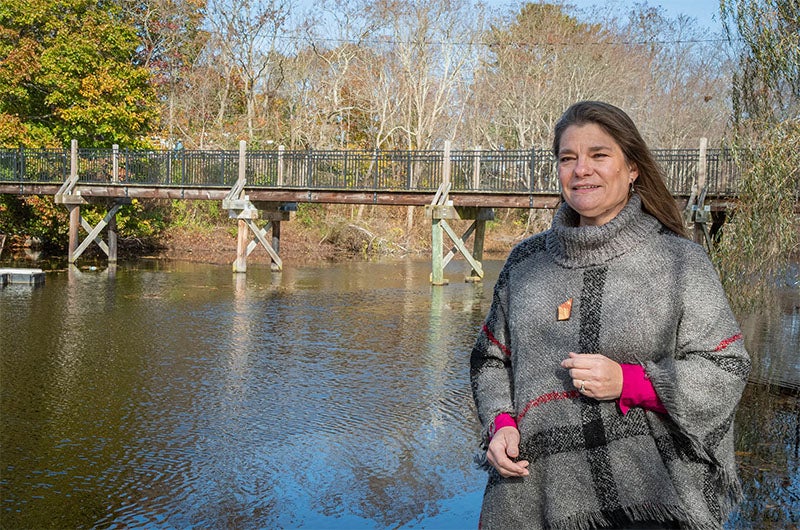KINGSTON, R.I. – July 10, 2023 – The University of Rhode Island’s Watershed Watch Program recently received the 2023 National Water Quality Monitoring Council’s Vision Award. The award recognizes monitoring groups that have demonstrated extraordinary vision and cooperation in the field of water quality monitoring to enhance the management and protection of local aquatic resources.
URI’s Watershed Watch was recognized by the North American Lake Management Society, at its annual national conference this year.
In presenting its 2023 Vision Award, the society called URI’s Watershed Watch program a leader in Rhode Island, across New England, and across the nation, as an exemplary water monitoring program.
Since 1988, URI’s Watershed Watch has brought together more than 100 organizational partners and trained thousands of volunteer water monitors. The program, currently led by Elizabeth Herron, maintains long-term partnerships with the state of Rhode Island, 14 municipalities, 23 environmental and sporting organizations, one Native American tribe, 14 lake associations/management districts, and six national organizations. Watershed Watch is also a national leader, connecting and training volunteer program leaders across the nation for more than two decades.
With 14 lakes initially monitored, the program has expanded over time to include fresh and saltwater ponds, reservoirs, rivers, streams, bays, swimming areas, and surf beaches. Trained volunteers are tracking water quality across the state, from Herring Pond in Burrillville, to the Great Salt Pond on Block Island. In 2022 alone, more than 400 volunteers collected water data at more than 250 locations at sites in Rhode Island, as well as Connecticut, Massachusetts, and New York. Watershed Watch staff also enlist volunteers in tracking cyanobacteria blooms and supporting specialized initiatives, such as monitoring stormwater and aquatic invasive species.
Watershed Watch’s efforts to train and support volunteers to carry out scientifically sound water monitoring across at hundreds of sites during more than three decades have had lasting impacts. The program’s monitoring has informed research, policies, and benefited individuals, the environment, and surrounding communities.
Elizabeth Herron, program director, was pleased to learn of URI Watershed Watch’s recognition, crediting the vision that Art Gold and Linda Green had so many decades ago, and that URI Cooperative Extension continues to support.
“We have access to top-notch research equipment through Cooperative Extension,” Herron says. “Being connected with the University of Rhode Island means our volunteers get involved in research and education.”
Watershed Watch works with a number of nonprofit organizations, such as the Wood-Pawcatuck River Association, Narrow River Preservation Association, Woonasquatucket River Watershed Council, Save Bristol Harbor, and the Salt Ponds Coalition. It also works with some groups outside of state lines. “Watersheds don’t care about regional boundaries,” Herron laughs.
URI has been leading work in the field of volunteer water quality monitoring since the 1980s, Herron says, with an outsize impact for the state’s size.
“We have a little history of big programs,” she says.
Still, she acknowledges that it can be a challenge to promote a program that by its nature, does the same thing over and over. “Often funding organizations want to fund the new and interesting, exciting and innovative,” she says. “It can be hard to get funding to do the same things over and over, which is what water monitoring really is.”
It can be a challenge to find the support for that, but that repetition is essential.
“Over time you build your data sets,” Herron says. “Now 35-plus years later we can detect trends that 10 years ago we would not have been able to. With 10 to 35 years of data, we can observe the impacts of climate change and help mitigate its influence on bodies of water.”
Now in its 36th year, Watershed Watch provides information on surface water quality of lakes, ponds, reservoirs, rivers, streams and the marine environment throughout southern New England. Learn more at https://web.uri.edu/watershedwatch/.

